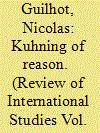| Srl | Item |
| 1 |
ID:
142113


|
|
|
|
|
| Summary/Abstract |
Neorealism is one of the most influential theories of international relations, and its first theorist, Kenneth Waltz, a giant of the discipline. But why did Waltz move from a rather traditional form of classical realist political theory in the 1950s to neorealism in the 1970s? A possible answer is that Waltz's Theory of International Politics was his attempt to reconceive classical realism in a liberal form. Classical realism paid a great deal of attention to decisionmaking and statesmanship, and concomitantly asserted a nostalgic, anti-liberal political ideology. Neorealism, by contrast, dismissed the issue of foreign policymaking and decisionmaking. This shift reflected Waltz's desire to reconcile his acceptance of classical realism's tenets with his political commitment to liberalism. To do so, Waltz incorporated cybernetics and systems theory into Theory of International Politics, which allowed him to develop a theory of international relations no longer burdened with the problem of decisionmaking.
|
|
|
|
|
|
|
|
|
|
|
|
|
|
|
|
| 2 |
ID:
144045


|
|
|
|
|
| Summary/Abstract |
Beyond the initial infatuation with his work, Kuhn’s Structure of Scientific Revolutions has had a lasting impact on the field of International Relations. The article analyses the reception of Kuhn in IR and suggests that it contributed to overcoming the ‘second debate’ by making science and realism fully compatible. More importantly, Kuhn offered a vision of science in which scientific communities operated on the basis of realist principles. This not only consolidated the academic hold of neorealism, but transformed realism into a theory of knowledge, which its critics have failed to acknowledge. This lasting transformation is analysed by looking at Kuhn’s influence on the classic studies of strategic decision-making by Graham Allison and Robert Jervis.
|
|
|
|
|
|
|
|
|
|
|
|
|
|
|
|
| 3 |
ID:
085592


|
|
|
|
|
| Publication |
2008.
|
| Summary/Abstract |
The study of international relations (IR) took an important disciplinary turn in the 1950s, when a number of scholars sought to develop a distinct theory of international politics. This turn, however, should not be understood as a tendency toward specialization, but rather as a separatist movement, meant to insulate the study of international politics from the behavioral revolution that was transforming the practice of political science in postwar America. Promoted by the Rockefeller Foundation, the "theorization" of IR encapsulated a very specific intellectual and ultimately political agenda at odds with the kind of liberalism dominant at the time.
|
|
|
|
|
|
|
|
|
|
|
|
|
|
|
|